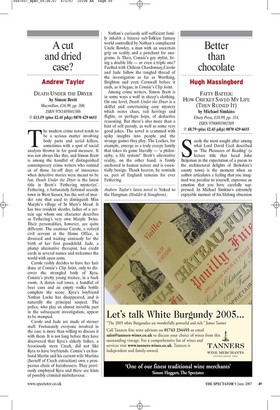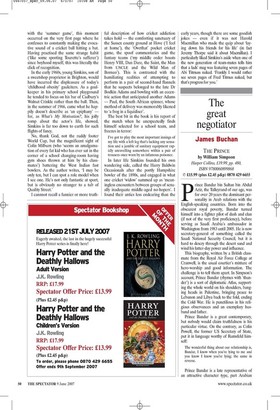Better than chocolate
Hugh Massingberd FATTY BATTER: How CRICKET SAVED MY LIFE (THEN RUINED IT) by Michael Simkins Ebtuy Press, £10.99, pp. 314, ISBN 9780091901509 © £8.79 (plus £2.45 p&p) 0870 429 6655 Surely the most sought after among what Lord David Cecil described as 'The Pleasures of Reading' (a lecture title that lured John Betjeman in the expectation of a paean to the architectural delights of Berkshire's county town) is the moment when an author articulates a feeling that you imagined was peculiar to yourself, expresses an emotion that you have carefully suppressed. In Michael Simkins's extremely enjoyable memoir of his lifelong obsession with the 'summer game', this moment occurred on the very first page where he confesses to constantly making the evocative sound of a cricket ball hitting a bat. Having practised the same strange habit (like some sporting Tourette's sufferer') since boyhood myself, this was literally the click of recognition.
In the early 1960s, young Simkins, son of a sweetshop proprietor in Brighton, would have incurred the displeasure of today's 'childhood obesity' gauleiters. As a goalkeeper in his primary school playground he tended to focus on his bar of Cadbury's Walnut Crinkle rather than the ball. Then, in the summer of 1966, came what he happily doesn't describe as 'an epiphany' — for, as What's My Motivation?, his jolly romp about the actor's life, showed, Simkins is far too down to earth for such flights of fancy.
No, thank God, not the ruddy footer World Cup, but the magnificent sight of Cohn Milburn (who 'seems an amalgamation of every fat kid who has ever sat in the corner of a school changing-room having gym shoes thrown at him by his classmates') battering the West Indian fast bowlers. As the author writes, 'I may be only ten, but I can spot a role model when I see one. He's not only fantastic at sport, but is obviously no stranger to a tub of Quality Street.'
I cannnot recall a funnier or more truthful description of how cricket addiction takes hold — the comforting sanctuary of the Sussex county ground at Hove (I feel at home'), the `Owzthaf pocket cricket game, the spoof commentaries and the fantasy teams (my middle order boasts Henry VIII, Dan Dare, the Saint, the Man from UNCLE and the Wild Man of Borneo'). This is contrasted with the humiliating realities of attempting to perform in a pair of second-hand flannels that he suspects belonged to the late Dr Bodkin Adams and bowling with an eccentric action that anticipated another Adams — Paul, the South African spinner, whose method of delivery was memorably likened to 'a frog in a liquidiser'.
The best bit in the book is his report of the match when he unexpectedly finds himself selected for a school team, and freezes in terror: I've got to play the most important innings of my life with a left leg that's lacking any sensation and a jumble of sanitary equipment rapidly unravelling somewhere within a pair of trousers once worn by an infamous poisoner.
In later life Simkins founded his own wandering side, called the Harry Baldwin Occasionals after the portly Hampshire bowler of the 1890s, and engaged in what one cricket 'widow' summed up as 'meaningless encounters between groups of sexually inadequate middle-aged no-hopers'. I found their antics less endearing than the early years, though there are some goodish jokes — even if it was not Harold Macmillan who made the quip about 'laying down his friends for his life' (in fact Jeremy Thorpe said it about Macmillan). I particularly liked Simkins's aside when one of the new generation of team-mates tells him that a lads' mag was featuring seven pages of Abi Titmuss naked. `Frankly I would rather see seven pages of Fred Titmus naked, but that's progress for you.'





























































 Previous page
Previous page